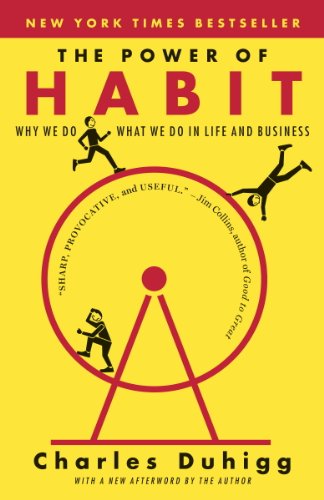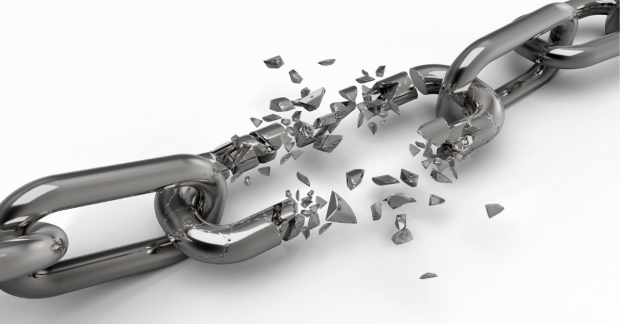Humans are creatures of habits. And unfortunately, when those habits are the more unhealthy ones, they seem to have some sort of power over us. They say it takes anywhere from 18 to 254 days to break a habit and 66 days for one to become automatic, so when you’re trying to break, it seems like we’re getting the raw end of the deal. Don’t be discouraged! Breaking a bad habit is actually less intimidating than it seems.

The Power of Habit
by Charles Duhigg
⏱ 14 minutes reading time
🎧 Audio version available
Figure Out Your Habit Loop
Ever thought of why breaking an unhealthy habit is so hard? Habits can be broken down into three components; there’s a trigger, for example, like feeling stressed, there’s a behavior, such as scrolling through social media, and then there’s a reward, which is feeling sated. Your mind and body want to do more of the thing that feels good– and they want to do less of what makes them feel bad or stressed.
Every time you practice the bad habit and reinforce the reward, the more likely you are to repeat this behavior. That’s why breaking old habits is so challenging. The first step in learning a way around this reward-based system is figuring out the loop. What are your triggers?
A trigger can be something as simple as feeling hungry, followed by a behavior, which is eating junk food, and then concluded with a reward that is, again, feeling sated. So if the habit you’re trying to break out from is stress eating at work, for instance, pay closer attention to the loop. What are your surroundings when you reinforce this habit? Are you trying to procrastinate? Do you have too much to do that you feel out of control so you seek that control somewhere else?
Once you’re able to name the indulgent actions you find comfort in– such as snacking on unhealthy foods during challenging assignments or scrolling through social media instead of working, it’s time to turn to the next step.
Prepare For Discomfort
The cold, hard truth? There is going to be some discomfort involved, and that’s okay! Everything good in life deserves a little hard work.
Humans are hardwired to resist discomfort. That’s why we often find ourselves lacking in willpower to continue working on changing these seemingly innate habits. Because we wait for this mystical feeling to come over us and do the work for us. And when it actually feels uncomfortable, we’re unwilling to continue.
So whether your goal is to quit eating junk food, going on the internet so much, eating healthier, to work out more, know that when you prepare yourself firsthand, knowing that breaking unhealthy habits is bound to…not, well, feel amazing, you’re already one step ahead.
Have a Game Plan
Your plan can’t just be to quit “cold turkey” and leave it at that. You also need to have contingencies in case you relapse, in case you find yourself back in the same situation, faced by the same triggers, and having no idea what to do.
When you’re trying to break an unhealthy– or even start a new one entirely, setting a game plan is incredibly rewarding. Here’s what needs to be included. Begin by writing out a start date before listing all the ways you’ll change this behavior. What’s next takes over time: it’s tracking your progress.
Set Realistic Goals
We said it once and we’ll repeat it again. Quitting cold turkey doesn’t work for everyone. A mindset of “all or nothing” is detrimental to most, if not all, unhealthy habit-breakers.
When you embark on this journey, you start with this rush of motivation. Your mind and body are pumped to get started and show off to everyone who said you couldn’t. As a consequence, you bite off more than you can chew. Instead of starting off slow with a realistic goal, they go big. They promise, for example, to work out every day. And on the very first day, they go for a 30-minute run. Guess what? The most likely scenario is feeling tired– and frustrated– and stopping this exercise. When you first start out, make your goals bite-size, and then gradually make them bigger.
Trick the Reward System
Our brains are hardwired to seek reward right? We want that rush of dopamine, that “good feel” hormone, even if it comes at the cost of our own wellbeing.
Well, it’s time to trick that reward system and turn it to your advantage. Our minds are always looking for a bigger, better offer, anyway, so why not provide it?
Provide yourself with an incentive for when you break those unhealthy habits. Provide yourself with an incentive every time you make progress. Some reward themselves with symbolic rewards. Some save a dollar every time they engage in a healthy habit. And there, now you have a new habit.
Keep Temptation Away
Oftentimes, the biggest temptation is you. If you want to improve your wellbeing, watching your self-talk makes a world’s difference. Humans, wired to want to jump to the reward and not actually do all of the hard work, tell themselves excuses. “Maybe now isn’t the best time.” “I’ll start at another time.” “Life is already challenging enough at the moment.” Watch the self-talk and stop yourself before you break your own successful streaks.
And then there’s another temptation, the big elephant in the room. If you’re a smoker, it’s the pack of cigarettes in your drawer. It’s the cabinet full of junk food, the fridge full of soda, et etcetera. Don’t tempt fate. Now is not the time to test your willpower, especially if you’re just starting out. Keep the unhealthy foods you’re trying to quit out from your fridge and pantry. Turn it again in a different reward system. The money you were going to spend on them can be saved or used on something else you really wanted.
A nice trick is to recognize your cues. A cue to a bad habit is the context during which you engage in the behavior. Examples of cues include work breaks, the dessert section of the menu, and so on. Even if you’ve done so good so far, you’re more likely to experience a relapse in the context of when you’ve reinforced the bad habit before. Do your best to get rid of those reminders and stay away from the contexts as much as possible.
Leave Yourself Reminds
Speaking of reminders, how about leaving some helpful ones out for your future gain? This is where you can get as creative as you want. Leave your future self sticky notes, stickers, or any visual reminder. Then the next time you’re about to relapse, you can be the thing that makes you rethink the action about to trigger you.
That’s why people leave sticky notes on their fridges so the next time they reach for it, they second guess that. Get with the modern times and use smartphone reminders if you want. Set alarms and reminders and add a motivational note at the end.
Remember That It’s a Journey
Breaking a habit can take anywhere from 18 to 254 days. What that says is that it’s a switch you can flip and suddenly be cured. Instead of saying that you have to follow a maintenance schedule, encourage yourself by realizing you’re also on a journey.
Think of the challenges that crop up as trials to this journey. You just have to get through them and then you’ll emerge a champion on the other side.
Shift Your Mindset
How do you shift your mindset? Tricking it is one way. Instead of saying you’re trying to stop something as it’s hard to stop a behavior, especially if it’s one you’ve been used to for a long time as humans are notorious creatures of habits, think of it as starting a new habit.
Our minds are tricky. The more we try to suppress a thought, the more likely we are to never stop thinking about it. One study tested this by telling their participants to suppress their thoughts about eating chocolate. Those who did ended up consuming a significantly larger amount of chocolate than those who didn’t.
Know Your Reason For Quitting
Are you trying to abandon a bad habit because you know it’s detrimental to your wellbeing? Are you trying to be a more productive student or employee?
What’s even better than saying you want to quit an unhealthy habit because you know it’s bad for you, find a better, deeper reason for quitting. We bet you there is one you may not even be aware of at the beginning.
Why should you do this? Sometimes, bad habits will rear their unhealthy heads and tempt us back with rewards. That’s why having intrinsic motivation is so important. You know you may never replace that euphoric feeling, but there are some things that are more important than it: your health and wellbeing, your happiness, your family and friends, et cetera. Giving up that detrimental habit allows you to strive for something more, and that may just make all the difference.
What Is Snapreads?

With the Snapreads app, you get the key insights from the best nonfiction books in minutes, not hours or days. Our experts transform these books into quick, memorable, easy-to-understand insights you can read when you have the time or listen to them on the go.



